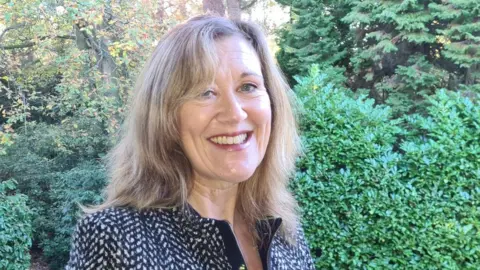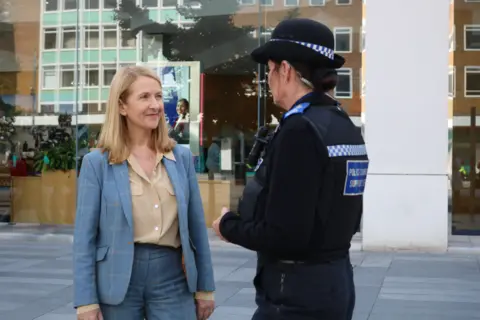Stalking victims not protected by police, say campaigners
 Dennys Ilic
Dennys IlicVictims have said they are not being protected by police, a decade after stalking was made a specific offence.
Former TV presenter Isla Traquair, who was stalked by a man who stared at her while she was washing, said officers treated her complaint as a neighbourhood dispute.
It comes as data shows only 6% of reported stalking cases in England and Wales end up in charges being brought.
The Home Office said it took stalking "extremely seriously".
But the National Police Chiefs' Council (NPCC) said it recognised more needed to be done to improve outcomes for victims.
'I don't recognise myself'
Ms Traquair suffers nightmares and panic attacks due to the behaviour of Jonathan Barrett.
A former ITV and Channel 5 news presenter, Ms Traquair was targeted by Barrett for seven months between March and September 2021.
In that time, he stared into her bedroom window and chain-sawed a bush in her garden.
Speaking to BBC Radio 4's Woman's Hour, she described one incident when Barrett appeared outside her home as she prepared to wash herself.
"I looked up and I got the fright because he was standing outside my conservatory, I was just about to take my clothes off," said Ms Traquair.
"I ducked down, it was 7am in the morning. That was when I got the one-way mirror film put in."
Barrett was found guilty of stalking in July this year and was ordered to complete 300 hours of community service and pay £715 in costs.
The Wiltshire gardener, aged 53 at the time of his conviction, was also handed a restraining order not to contact Ms Traquair, or to enter or look into her property for one year.
Ms Traquair said she felt at first that her ordeal was being treated as "some sort of neighbourhood dispute".
"I had to fight," she said.
"I feel so unsafe with the world because I've not been protected by the police. I don't recognise myself anymore.
"I'd say probably 100 victims of stalking, men and women, have contacted me since my story has gone public.
"There's not a single one of them that praises the police for the way they handled it."
What the data says?

Figures analysed by the BBC's Shared Data Unit found the rate of reported stalkers charged by police has almost halved over the past two years.
Charge rates have fallen from 11% to 6% from 2020-2022, a continuing year-on-year trend from 2014-15 where it was as high as 37%.
A third of all cases are dropped because of difficulties in collecting evidence - despite the victim supporting action.
And more than half of reported cases end with the victims not supporting further action.
The number of recorded stalking offences has more than tripled since 2019-20 in England and Wales. The Home Office said this was due to changes in the way stalking was recorded by police forces.
Of the cases that do end up in court, the conviction rate for stalking offences is 66% across England and Wales.
Meanwhile, the use of Stalking Protection Orders (SPOs) has also fallen in the past year.
They are civil orders which aim to protect victims, and it is a criminal offence to breach the terms of an order.
Freedom of Information requests from 27 of the 42 police forces in England and Wales show a 31% drop in the number of SPOs applied for - with 310 fewer applications.
'I thought I was going mad'
 Tracey Morgan
Tracey MorganTracey Morgan was stalked for nine years, but says she was treated as an "emotional, paranoid female" by police.
Her stalker - a former co-worker - had 20 convictions related to stalking her. Her ordeal only stopped when he was jailed for life in 2001 for the attempted murder of another woman.
But Ms Morgan said stalking was treated as a "nuisance crime" when she went to police for help.
"I was on sleeping pills, thinking I was going mad. I was terrified. It felt like he pushed a self-destruct button and was going to take me with him.
"I had to be prepared every day, every night, in case things continued because there was nothing in the law to stop what he was doing.
"But [when I went to the police] I was labelled an emotional paranoid female and told not to be paranoid. It was treated as a bit of a joke."
Ms Morgan went public with her case in 1995, and her campaigning work helped lead to legislation being changed in November 2012.
 Delyth Jewell
Delyth JewellTen years on she said she feels laws aren't being used as they should.
"I felt very privileged to be at a reception at Number 10 and hear it first hand, it was ground-breaking and indicated huge steps forwards", said Ms Morgan.
"But I know victims still have difficulty with being taken seriously.
"There's still a misunderstanding that stalking is just a benign crime, because you can't see the injuries I have - they're all in my head."
How the law has changed?
- The Protection of Harassment Act was introduced in March 1997 to tackle all forms of harassment, which included stalking
- In November 2012, the Government introduced two new specific offences in England and Wales - Stalking and Stalking involving a fear of violence
- In Scotland, this law was introduced in 2010. Northern Ireland passed this law earlier this year
- Stalking at the time was given a maximum sentence of five years - that's since been doubled to 10
Katy Bourne, the Police and Crime Commissioner for Sussex, is the lead for stalking in Wales and England.
A victim of stalking herself, Ms Bourne said she was left frustrated by the legal system after she was stalked for five years.
She called for the justice system to use stalking legislation as the default, rather than opting for harassment laws.
 Police and Crime Commissioner for Sussex
Police and Crime Commissioner for Sussex"It's good to recognize that we do have stalking legislation, that's a huge step forwards," Ms Bourne said.
"But I think there is still a lot more to do from all agencies, from making sure police recognise it to ensuring the courts and partners prosecute it successfully."
The Home Office said: "We take our response to stalking extremely seriously, which is why we have doubled the maximum sentence for stalking from five to ten years.
"In January 2020 we introduced Stalking Protection Orders for police forces, a new civil order to protect victims of stalking at the earliest possible opportunity. 456 orders were issued in their first year."
National Police Chiefs' Council lead for stalking and harassment, Deputy Chief Constable Paul Mills, said specialist advisors, new powers and bespoke training had been introduced to improve standards in all police forces in England and Wales.
"We recognise there is more to do to improve the criminal justice system outcomes for victims of stalking and are working closely with the CPS to understand the attrition of cases before the point of charge and court", added Mr Mills.
For information and support on stalking go to https://www.bbc.co.uk/actionline
